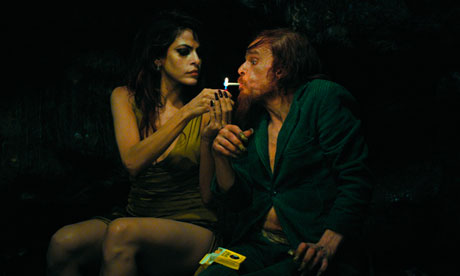
What the hell is Holy Motors (2012, Artificial Eye, 18) all about? Leos Carax's first feature film for more than a decade (following the commercial failure of Pola X) is a breathtakingly barking affair involving chimpanzees, aliens, computer graphics, talking limousines, false noses, Kylie Minogue channelling Jean Seberg and Eva Mendes being kidnapped by a familiar troll named Merde. "It's so weird!" breathes an incidental character ecstatically, and he's not kidding.
At the centre of it all is the mesmerising Denis Lavant, a fiery angel and existential artist who travels from location to location adopting quixotic personas (twisted beggar woman, scarred hitman, dying uncle, angry father) and performing real-life vignettes amid the great circus of screen life. From the earliest chronophotographic images of bodies in motion to virtual sex in mo-cap suits, Carax hurtles helter skelter through an urgent history of cinema, nodding toward Chaplin, Cocteau, Lynch and (most bizarrely) John Lasseter. When Lavant's chauffeur, Edith Scob, dons what looks like the mask from Les yeux sans visage, I thought I might actually faint.
A treatise on the moving image; a parable for the actor's craft; a profound meditation; a playful prank – Holy Motors is all these things and more. Bewildering, bewitching, but crucially never boring, this is one of the most thrillingly adventurous films of recent years. Lordy, lordy!
Coming on like Twelve Monkeys with more guns, Looper (2012, Entertainment One, 15) is an unashamedly derivative but undeniably enjoyable sci-fi action romp that starts out mashing up themes from Terminator 2, Memento and Source Code and then mutates midway into a strange hybrid of The Omen and The Shining, with a hint of Signs and a little bit of Firestarter and Children of the Corn thrown in for good measure. Oh, and (according to the ads) The Matrix. Echoing his role from Gilliam's epochal classic, Bruce Willis plays the futuristic outlaw sent back in time, where his path crosses with that of his younger self at the exact moment of his appointed death. Having explicitly warned us that thinking about the time-travelling mechanics of the plot too much "just fries your brain", this barrels along fast enough to create the illusion of making sense – almost.
Writer/director Rian Johnson, who made such a splash with Brick, handles the warring genre elements with aplomb, while Joseph Gordon-Levitt maintains his own identity even as his face melds with that of Big Bruce.
Amid the recent slew of ghoulishly inflected kids' flicks (Hotel Transylvania, Frankenweenie), Laika studio's ParaNorman (2012, Universal, PG) stands out as the most ambitiously remarkable. As beautifully animated as its stop-motion stablemate Coraline, this tale of a misfit kid from a Salem-style town dares to treat its young audience as intelligent, intuitive and adventurous, finding lively joy in the macabre (its hero merrily watches zombie movies with his dead grandmother) while delving deeper than many "grown-up" films into the politics of its scarifying backstory.
People talk constantly of the harm done to kids by horror movies, but ParaNorman reminds us how helpful and creative the genre can be, exhibiting a healthy feminist disdain for the history of witch hunting and a poignant despair at child abuse. For all its "mild comic horror and violence, frightening sequences and innuendo", this is a film with an innocent heart: perfect fare for aspiring goths and their balding parents alike.
Withheld from critics on its UK cinema release, the second feature from former Radio 1 DJ Mark Tonderai has none of the stylish cutting edge of his calling-card debut, Hush. What House at the End of the Street (2012, Momentum, 15) does have is Jennifer Lawrence (before The Hunger Games made her a global superstar), upon whose shoulders rests this by-numbers tale of a new girl in town befriending the creepy neighbour whose murderous family reputation precedes him. Originally slated for direction by Jonathan Mostow from a Richard Kelly script, this has clearly gone around the block enough times to have all its interesting edges knocked off. It's not terrible, just terribly ordinary, disappointingly lacklustre and, crucially, not scary.
It would be easy to sneer at Now is Good (2012, Warner, 12), an adaptation of Jenny Downham's novel Before I Die, about a young woman with a terminal illness fiestily ticking dreams off her bucket list. But with Dakota Fanning and Paddy Considine doing sterling work as the daughter and father caught in the emotional maelstrom, you'd have to be pretty hard-hearted not to find yourself moved (to tears) as nature takes its unstoppable course. Perfectly understanding its target audience's infatuation with romantic tragedy, this plays its melodrama straight and faces its harsh realities fairly full on, even when mediated through the gauze of a Love Story-lite soft filter. I'm not ashamed to admit I cried.

